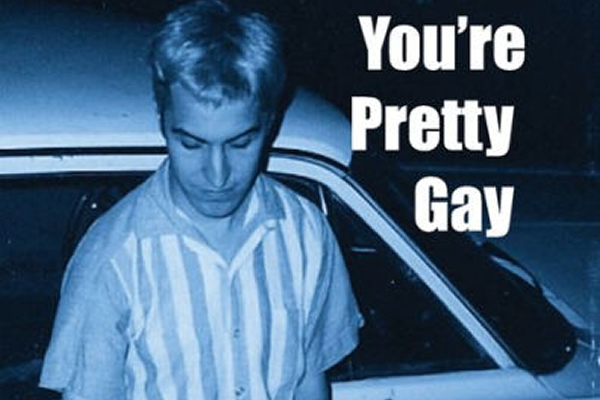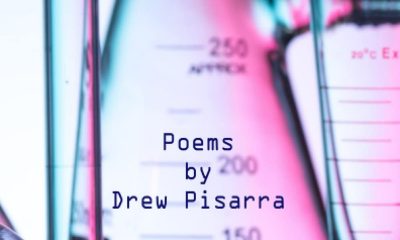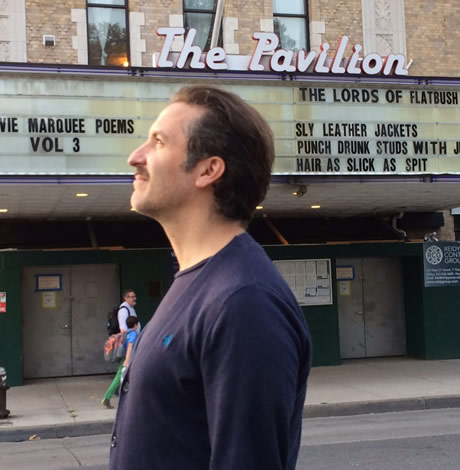Books
Drew Pisarra’s ‘dangerously funny and queerly inventive brain’
‘You’re Pretty Gay’ shatters expectations and social mores

Is there anything more absurd than this, wondered gay poet and writer Drew Pisarra. Pisarra, then, was an assistant to a paralegal at a toothpaste company.
Fiercely protective of the pattern on its toothpaste, they wrote letters to rivals who, they felt, were infringing on their copyright.
Even when their competitors were in countries in the middle of a civil war, “They would write back, ‘we can’t respond now, we’re in a war,’” Pisarra said.
But that didn’t soften the heart of the toothpaste company. They’d insist that “this most important matter be dealt with as soon as the war ends,” Pisarra said.
If you think that authors don’t encounter the absurdity and grit of everyday life or that all writers do is drink coffee (or sip stronger libations) while looking at the sunset, you haven’t met Pisarra.
Pisarra, 56, whose new short story collection “You’re Pretty Gay” is just out from Chaffinch Press, has worked at everything from ventriloquism to domestic work.
The word “unique” is so hackneyed that it’s a cliche to say it’s a cliche. But there’s no other way to describe “You’re Pretty Gay.”
This collection “is a prime example of Drew Pisarra’s dangerously funny and queerly inventive brain,” said Kevin Sampsell, author of “This Is Between Us.” “Each story is its own performance, its own shattering of expectations and social mores.”
Pisarra, who lives in Manhattan, gives readers a mosaic of wit, surrealism, sex, queerness, memory, mortality and self-discovery.
In “You’re Pretty Gay,” there are gay bars in New York and New Orleans.
You’ll find everything from adolescent bullies fighting over a rare caterpillar to a character taking an AIDS test and, later, meeting up with Mrs. Claus.
“Mrs. Claus I didn’t even know you were alive,” says the narrator of “Arctic Chill.” “I didn’t even know you were real. I haven’t received a gift from you or your husband in ten years.”
Another of Pisarra’s tales revolves around a trip to hell. “I love traveling,” says the narrator of “The Hat from Hell, “I got this hat when I was in Hell back in 1992.”
In “Granny,” siblings gather after their mother’s death. “All anyone could remember of her was that chair, how she sat in it for the last 40 years,” Pisarra writes, “immobile as ‘Jeopardy’ and the ‘Wheel of Fortune’ glared at her night after night.”
Pisarra’s characters yearn to find love, sex, and who they really are.
“In my quest to bed mankind, I tended to avoid perfection’s rejection,” says the narrator of “Every Man for Myself.”
Pisarra, whose first short story collection “Publick Spanking” was published in 1996, was born in Orange, N.J. When he was in the third grade, he moved to Maryland. There, except for living in Oxon Hill for a year, he grew up in Silver Spring.
When Pisarra was growing up, being gay wasn’t even remotely on the horizon. “There was such denial in the culture then,” Pisarra said.
From early on, he had feelings for men. “I had a crush on a boy in kindergarten,” Pisarra said.
He consulted books and a priest, which wasn’t helpful. They said he’d grow out of it.
“As a teenager, I recognized that I hadn’t outgrown it,” Pisarra said.
Pisarra was a college freshman when he came out. “I sobbed the night I came out,” he said.
He was out in college, Pisarra said, “but I wasn’t getting laid.” That changed when he moved to New Orleans after college.
Pisarra graduated from Hofstra University in 1987 with a bachelor’s degree in theater.
In college, a professor had the students sit in a circle. Then, the teacher told them how she thought they’d be cast.
“She told me, ‘you’re a grotesque,’”Pisarra said, “‘You won’t work until you’re in your fifties. Because your face and body don’t match.’”
Pisarra was relieved to hear this. His sense of relief was related to being a young gay man in the late 1980s.
“I wasn’t interested in being closeted,” Pisarra said, “I wrote. I wanted to perform. I wasn’t interested in conforming.”
Since then, Pisarra has been creating – performing and writing his own material. Some of the stories in “You’re Pretty Gay” were originally created for the stage.
“I don’t write that often,” Pisarra said, “I started writing the stories in ‘You’re Pretty Gay’ 20 years ago.”
A prodigious reader, Pisarra has always “written to some degree,” he said.
Pisarra got turned on to writing poetry when he went to a meeting of a gay and lesbian writers group.
“There were, like, 10 people in this apartment,” Pisarra said, “there was a terrible woman sitting next to me.”
He would have dropped out of the group, if he hadn’t met writer Mare Davis, now his close friend.
“I said to her, ‘I never want to see any of these people again except you,’” Pisarra said, “She inspired me to get into poetry.”
Davis wrote the introduction to Pisarra’s poetry collection “Infinity Standing Up” (Capturing Fire Press).
Released in 2019, the volume of sexy, playful sonnets received glowing reviews from the Washington Post, the Blade and other outlets.
“Devour me! Think me not some crazy nut!,” Pisarra writes in one of his sonnets.
With lines like these, he gives Shakespeare a run for his money.
Pisarra has held a variety of jobs – many of which have involved the arts. He has helped homeless people with mental health issues to find housing.
“I ran a writers group for them,” Pisarra said, “I encouraged a super-talented woman to send her work out.”
The woman and Pisarra submitted their work to the same magazine. “Her work was accepted. Mine wasn’t,” he said, “I was thrilled!”
In an unusual career twist, Pisarra, who received a literary grant from the Café Royal Cultural Foundation, toured a ventriloquist act entitled “Singularly Grotesque.” He created the act after the Portland Institute for Contemporary Art commissioned him to develop a new solo piece.
“I was wandering around the library aisles and I found two (self-help) pamphlets on talking with ‘multiple’ selves,’” Pisarra said, “and I thought this is ventriloquism in a nutshell.”
Pisarra hadn’t watched much TV. But that didn’t keep him from interviewing with AMC to be its director of digital media.
“I thought why not,” Pisarra said, “it would be a chance to see what else is out there in the world.”
He worked on the websites for “Mad Men” and “Breaking Bad.” “It was a pleasure to be part of the online team for these cultural phenomena!” Pisarra said.
With Molly Gross, Pisarra co-founded Saint Flashlight. In this project, he and Gross find inventive ways to get poetry into public spaces.
One of the project’s most innovative efforts has been putting haiku on movie marquees. It’s fun to see people, looking up, counting the syllables, Pisarra said. You sweat when you put the letters up on the marquee, he added.
“It’s part of the fun! It makes you feel like you’re making something matter,” Pisarra said.
He doesn’t want poetry to be confined to “The New Yorker.” “It should push the envelope,” Pisarra said, “It’s not just for the upper crust.”
Books
Embracing the chaos can be part of the fun
‘Make Sure You Die Screaming’ offers many twists and turns

‘Make Sure You Die Screaming’
By Zee Carlstrom
c.2025, Random House
$28/304 pages
Sometimes, you just want to shut the door and forget what’s on the other side.
You could just wipe it from your memory, like it didn’t occur. Or create an alternate universe where bad things never happen to you and where, as in the new novel “Make Sure You Die Screaming” by Zee Carlstrom, you can pretend not to care.

Their mother called them “Holden,” but they’d stopped using that name and they hadn’t decided what to use now. What do you call an alcoholic, queer, pessimistic former ad executive who’s also “The World’s First Honest White Man,” although they no longer identify as a man? It’s a conundrum that they’ll have to figure out soon because a cop’s been following them almost since they left Chicago with Yivi, their psychic new best friend.
Until yesterday, they’d been sleeping on a futon in some lady’s basement, drinking whatever Yivi mixed, and trying not to think about Jenny. They killed Jenny, they’re sure of it. And that’s one reason why it’s prudent to freak out about the cop.
The other reason is that the car they’re driving was stolen from their ex-boyfriend who probably doesn’t know it’s gone yet.
This road trip wasn’t exactly well-planned. Their mother called, saying they were needed in Arkansas to find their father, who’d gone missing so, against their better judgment, they packed as much alcohol as Yivi could find and headed south. Their dad had always been unique, a cruel man, abusive, intractable; he suffered from PTSD, and probably another half-dozen acronyms, the doctors were never sure. They didn’t want to find him, but their mother called…
It was probably for the best; Yivi claimed that a drug dealer was chasing her, and leaving Chicago seemed like a good thing.
They wanted a drink more than anything. Except maybe not more than they wanted to escape thoughts of their old life, of Jenny and her death. And the more miles that passed, the closer they came to the end of the road.
If you think there’s a real possibility that “Make Sure You Die Screaming” might run off the rails a time or three, you’re right. It’s really out there, but not always in a bad way. Reading it, in fact, is like squatting down in a wet, stinky alley just after the trash collector has come: it’s filthy, dank, and profanity-filled. Then again, it’s also absurd and dark and philosophical, highly enjoyable but also satisfying and a little disturbing; Palahniuk-like but less metaphoric.
That’s a stew that works and author Zee Carlstrom stirs it well, with characters who are sardonic and witty while fighting the feeling that they’re unredeemable losers – which they’re not, and that becomes obvious.
You’ll see that all the way to one of the weirdest endings ever.
Readers who can withstand this book’s utter confusion by remembering that chaos is half the point will enjoy taking the road trip inside “Make Sure You Die Screaming.”
Just buckle up tight. Then shut the door, and read.
The Blade may receive commissions from qualifying purchases made via this post.
Books
Two new books on dining out LGBTQ-style
Visit nightclubs, hamburger joints, and a bathhouse that feeds customers

‘What is Queer Food? How We Served a Revolution’
By John Birdsall
c.2025, W.W. Norton
$29.99/304 pages
‘Dining Out: First Dates, Defiant Nights, and Last Call Disco Fries at America’s Gay Restaurants’
By Erik Piepenburg
c.2025, Grand Central
$30/352 pages
You thought a long time about who sits where.
Compatibility is key for a good dinner party, so place cards were the first consideration; you have at least one left-hander on your guest list, and you figured his comfort into your seating chart. You want the conversation to flow, which is music to your ears. And you did a good job but, as you’ll see with these two great books on dining LGBTQ-style, it’s sometimes not who sits where, but whose recipes were used.
When you first pick up “What is Queer Food?” by John Birdsall, you might miss the subtitle: “How We Served a Revolution.” It’s that second part that’s important.

Starting with a basic gay and lesbian history of America, Birdsall shows how influential and (in)famous 20th century queer folk set aside the cruelty and discrimination they received, in order to live their lives. They couldn’t speak about those things, he says, but they “sat down together” and they ate.
That suggested “a queer common purpose,” says Birdsall. “This is how who we are, dahling, This is how we feed our own. This is how we stay alive.”
Readers who love to cook, bake or entertain, collect cookbooks, or use a fork will want this book. Its stories are nicely served, they’re addicting, and they may send you in search of cookbooks you didn’t know existed.
Sometimes, though, you don’t want to be stuck in the kitchen, you want someone else to bring the grub. “Dining Out” by Erik Piepenburg is an often-nostalgic, lively look at LGBTQ-friendly places to grab a meal – both now and in the past.

In his introduction, Piepenburg admits that he’s a journalist, “not a historian or an academic,” which colors this book, but not negatively. Indeed, his journeys to “gay restaurants” – even his generous and wide-ranging definitions of the term – happily influence how he presents his narrative about eateries and other establishments that have fed protesters, nourished budding romances, and offered audacious inclusion.
Here, there are modern tales of drag lunches and lesbian-friendly automats that offered “cheap food” nearly a century ago. You’ll visit nightclubs, hamburger joints, and a bathhouse that feeds customers on holidays. Stepping back, you’ll read about AIDS activism at gay-friendly establishments, and mostly gay neighborhood watering holes. Go underground at a basement bar; keep tripping and meet proprietors, managers, customers and performers. Then take a peek into the future, as Piepenburg sees it.
The locales profiled in “Dining Out” may surprise you because of where they can be found; some of the hot-spots practically beg for a road trip.
After reading this book, you’ll feel welcome at any of them.
If these books don’t shed enough light on queer food, then head to your favorite bookstore or library and ask for help finding more. The booksellers and librarians there will put cookbooks and history books directly in your hands, and they’ll help you find more on the history and culture of the food you eat. Grab them and you’ll agree, they’re pretty tasty reads.
The Blade may receive commissions from qualifying purchases made via this post.

You’re going to be on your feet a lot this month.
Marching in parades, dancing in the streets, standing up for people in your community. But you’re also likely to have some time to rest and reflect – and with these great new books, to read.
First, dip into a biography with “Marsha: The Joy and Defiance of Marsha P. Johnson” by Tourmaline (Tiny Rep Books, $30), a nice look at an icon who, rumor has it, threw the brick that started a revolution. It’s a lively tale about Marsha P. Johnson, her life, her activism before Stonewall and afterward. Reading this interesting and highly researched history is a great way to spend some time during Pride month.
For the reader who can’t live without music, try “The Dad Rock That Made Me a Woman” by Niko Stratis (University of Texas Press, $27.95), the story of being trans, searching for your place in the world, and finding it in a certain comfortable genre of music. Also look for “The Lonely Veteran’s Guide to Companionship” by Bronson Lemer (University of Wisconsin Press, $19.95), a collection of essays that make up a memoir of this and that, of being queer, basic training, teaching overseas, influential books, and life.
If you still have room for one more memoir, try “Walk Like a Girl” by Prabal Gurung (Viking, $32.00). It’s the story of one queer boy’s childhood in India and Nepal, and the intolerance he experienced as a child, which caused him to dream of New York and the life he imagined there. As you can imagine, dreams and reality collided but nonetheless, Gurung stayed, persevered, and eventually became an award-winning fashion designer, highly sought by fashion icons and lovers of haute couture. This is an inspiring tale that you shouldn’t miss.
No Pride celebration is complete without a history book or two.
In “Trans History: From Ancient Times to the Present Day” by Alex L. Combs & Andrew Eakett ($24.99, Candlewick Press), you’ll see that being trans is something that’s as old as humanity. One nice part about this book: it’s in graphic novel form, so it’s lighter to read but still informative. Lastly, try “So Many Stars: An Oral History of Trans, Nonbinary, Genderqueer, and Two-Spirit People of Color” by Caro De Robertis (Algonquin Books of Chapel Hill. $32.00) a collection of thoughts, observations, and truths from over a dozen people who share their stories. As an “oral history,” you’ll be glad to know that each page is full of mini-segments you can dip into anywhere, read from cover to cover, double-back and read again. It’s that kind of book.
And if these six books aren’t enough, if they don’t quite fit what you crave now, be sure to ask your favorite bookseller or librarian for help. There are literally tens of thousands of books that are perfect for Pride month and beyond. They’ll be able to determine what you’re looking for, and they’ll put it directly in your hands. So stand up. March. And then sit and read.

















